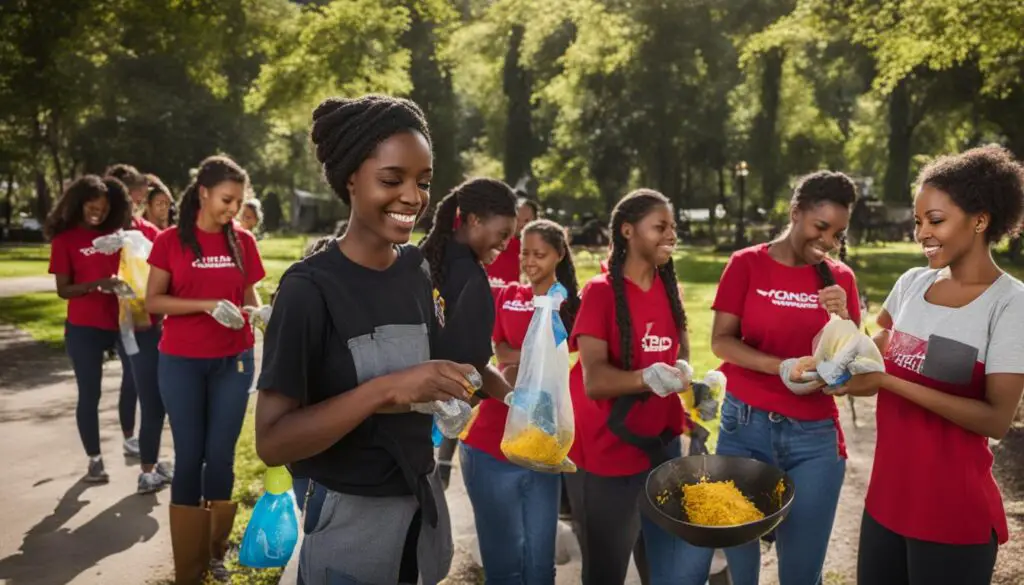Religion and volunteering go hand in hand, inspiring young people to engage in faith-based service and community projects. Religious organizations offer a multitude of volunteer opportunities, encouraging youth to actively participate in activities that benefit their communities and make a difference in the lives of others. By intertwining religious teachings with volunteerism, these organizations foster a sense of purpose and instill values of compassion, empathy, and service.
Through a variety of community service projects, young volunteers have the chance to put their faith into action and extend a helping hand to those in need. Whether it’s organizing food drives for the less fortunate, participating in environmental clean-up initiatives, or providing support to local shelters, religious community engagement creates a platform for young people to dedicate their time, talents, and resources to meaningful causes.
Key Takeaways:
- Religious teachings inspire youth to engage in faith-based service and community projects.
- Religious organizations provide numerous volunteer opportunities for young people.
- Youth volunteering promotes values of compassion, empathy, and service.
- Community service projects allow young volunteers to make a tangible impact in their communities.
- Religious community engagement encourages young people to dedicate their time and resources to meaningful causes.
The Impact of Religious Education Programs on Volunteerism
Religious education programs are instrumental in shaping the mindset of young people towards volunteerism. These programs go beyond teaching and leading and aim to provide a faith-development experience for both the teachers and the students. By emphasizing the mission and unique aspects of being in a religious setting, these programs create a fertile ground for volunteer engagement.
Religious education programs are designed to equip volunteer teachers with the necessary tools, guidelines, and support to enhance their engagement with children and youth. By nurturing the ministry of working with young people, religious education programs help volunteers deepen their faith and contribute to their communities.
Inspiring Faith-Development Experiences
Religious education programs frame teaching and leading as faith-development experiences, highlighting the spiritual growth that can be achieved through these activities. By integrating religious teachings into lesson plans and activities, these programs cultivate a sense of purpose and meaning in the volunteers’ work. Through teaching, volunteers are able to reflect on their own faith journey and impart valuable lessons to the younger generation.
Strengthening Community Engagement
Religious education programs play a vital role in instilling a sense of community in young volunteers. By engaging with children and youth within a religious context, volunteers develop a deep connection to their faith community. This connection fosters a strong sense of responsibility and commitment to serving others, ultimately leading to a more engaged and active community.
Teaching as a Rewarding Experience
Volunteering as a teacher in religious education programs offers a rewarding experience for individuals seeking personal growth and fulfillment. The opportunity to guide young minds and witness their spiritual development can be immensely gratifying. By imparting knowledge, values, and faith to the next generation, volunteer teachers contribute to the overall well-being of their communities.

| Key Benefits | Description |
|---|---|
| Faith-Development | Religious education programs provide an environment for teachers and students to deepen their faith and spiritual growth. |
| Community Engagement | By connecting volunteers with their faith community, religious education programs foster a sense of belonging and promote community involvement. |
| Personal Fulfillment | Teaching in religious education programs offers a rewarding experience, allowing volunteers to make a positive impact on the lives of children and youth. |
Providing Volunteer Training and Resources
To ensure that volunteer teachers are well-prepared and equipped to fulfill their roles effectively, religious organizations offer comprehensive training and a wide range of resources. These resources not only enhance the volunteer experience but also contribute to the overall success of faith-based service initiatives.
Volunteer Training:
Volunteer training programs are designed to equip volunteers with the necessary skills and knowledge to create meaningful and impactful experiences for the children and youth they serve. These training sessions cover various aspects of volunteerism, including:
- Classroom worship tools
- Child and youth development
- Group management advice
- Health and safety procedures
During volunteer training, volunteers learn how to utilize classroom worship tools effectively. This includes understanding the significance of chalice lightings, teaching children how to share their joys and concerns, and leading meditation sessions to foster a sense of calm and introspection.
Resources for Volunteer Teachers:
Religious organizations understand the importance of providing volunteer teachers with the necessary resources to support their work. These resources aid in delivering engaging and impactful lessons while fostering a nurturing environment for children and youth. Some of the key resources provided include:
- In-depth materials and programs
- Information on child and youth development
- Guidelines for health and safety procedures
- Group management advice
These resources ensure that volunteer teachers have access to the latest insights and best practices in child and youth development. They also provide guidance on creating inclusive and supportive environments where children and youth can thrive and grow.
Benefits of Volunteer Training and Resources:
By providing volunteer training and resources, religious organizations empower volunteer teachers to become effective leaders and mentors in their communities. These training programs and resources not only build the knowledge and skills of volunteers but also instill confidence and enthusiasm to serve. Additionally, they enable volunteers to create transformative experiences for children and youth that nurture their spiritual growth and foster a sense of belonging in the religious community.

| Benefits of Volunteer Training and Resources | Examples |
|---|---|
| Enhanced volunteer teacher skills and knowledge | Effective utilization of classroom worship tools |
| Improved child and youth development practices | Creating inclusive and supportive environments |
| Greater confidence and enthusiasm among volunteer teachers | Increased engagement and impactful mentorship |
Fostering Community Connections through Volunteerism
Religious organizations understand the importance of building community connections through volunteerism. By establishing strong ties with parents/guardians and creating spaces for volunteer teachers to connect and reflect, these organizations cultivate a sense of belonging and support within their communities.
Letters to Parents/Guardians
Image related to the keyword: foster community connections
To ensure transparent communication and community involvement, religious organizations frequently send letters to parents/guardians. These letters keep families informed about the activities and initiatives happening within religious education programs. This practice fosters a sense of inclusivity and encourages parents/guardians to actively participate in their child’s spiritual journey and the overall growth of the community.
Reflective Forums and Small-Group Ministries
Reflective forums and small-group ministries provide valuable opportunities for volunteer teachers to connect, reflect, and share their experiences with one another. These forums facilitate meaningful discussions, collaboration, and the exchange of ideas, creating a supportive and nurturing environment for volunteers. By engaging in reflective conversations, volunteer teachers gain insights, learn from each other’s perspectives, and enhance their skills in providing quality religious education.
“The reflective forums have been instrumental in bringing our volunteer teachers together. We have witnessed the power of collective wisdom, where teachers learn from each other’s experiences and explore new ideas to continuously improve our programs.” – Reverend Sarah Thompson, Community Church
| Benefits of Reflective Forums and Small-Group Ministries | Examples of Reflective Forum Topics |
|---|---|
|
|
Reflective forums and small-group ministries not only build stronger bonds among volunteer teachers but also foster a culture of continuous learning and improvement within the religious education programs. These initiatives contribute to the overall growth and vibrancy of the community, ensuring that youth receive the best possible faith-based education and guidance.
The Benefits of Faith-Based Volunteers
Faith-based volunteers bring significant advantages to nonprofit organizations, contributing to their mission and impact. Their involvement extends beyond service delivery, providing unique benefits that enhance agency visibility and strengthen connections with religious institutions.
One of the key advantages of faith-based volunteers is the promotion of agency visibility within religious institutions and networks. By actively engaging in volunteer work, these volunteers raise awareness about the organization and its mission, reaching a wider audience and garnering support for its initiatives. Their affiliation with religious communities also lends legitimacy and credibility to the agency, establishing trust and fostering long-term relationships.
Furthermore, faith-based volunteers reinforce the organization’s connection with its religious roots. Many nonprofit organizations have affiliations with sponsoring religious institutions, and faith-based volunteers serve as the embodiment of this partnership. Their active involvement symbolizes the shared values and common goals between the organization and religious institutions, deepening the connection and fostering collaboration.
In addition to enhancing agency visibility and strengthening connections, volunteering provides valuable opportunities for leadership development. In communities where religious institutions play a central role in social justice initiatives, faith-based volunteers often take on leadership positions, driving change and making a meaningful impact. Through their involvement in volunteer work, they develop skills such as communication, teamwork, and problem-solving, laying the foundation for their growth as leaders in their communities.
Overall, faith-based volunteers offer a unique blend of passion, commitment, and shared values that enrich the work of nonprofit organizations. They create a bridge between the agency and religious institutions, amplifying its visibility, and contributing to its mission. Furthermore, their engagement in volunteerism provides them with opportunities for personal and leadership development, ensuring a long-lasting impact on both the organization and the volunteer themselves.
The Motivations of Faith-Based Volunteers
Faith plays a significant role in motivating individuals to volunteer. Many volunteers are driven by their religious beliefs and the teachings of their faith regarding caring for others and seeking justice. They view volunteering as a way to express altruistic behavior and gratitude for the gift of life. However, the motivations of faith-based volunteers extend beyond pure altruism and religious duty. Volunteers may also seek personal benefits, such as gaining skills and connections or experiencing psychological satisfaction.
“Volunteering is not only about giving back to others; it is also an opportunity for personal growth and fulfillment.”
The desire for psychological satisfaction is rooted in the intrinsic rewards that come from helping others and making a meaningful impact. Volunteers experience a sense of purpose, fulfillment, and joy when their actions align with their deeply held religious beliefs. By engaging in acts of service, faith-based volunteers strengthen their connection to their religious community and deepen their spiritual journey.
Understanding these motivations is crucial for nonprofit organizations looking to attract and retain volunteers from the faith community. By highlighting the alignment between volunteering opportunities and religious beliefs, nonprofits can appeal to the intrinsic motivation and sense of purpose that faith-based individuals seek.
The Role of Altruism
Altruism, derived from the Latin word “alter,” meaning “other,” refers to the selfless concern for the well-being of others. It is a core value in many religious teachings and often the primary motivation behind volunteering. Faith-based volunteers embrace their religious beliefs’ call to love and serve others, viewing volunteering as a tangible expression of their faith.
“Love your neighbor as yourself.” – Matthew 22:39
Volunteering becomes a manifestation of altruistic behavior, embodying the teachings of empathy, compassion, and kindness found in religious texts. Through their selfless acts, faith-based volunteers aim to make a positive difference in the lives of others and contribute to the greater good.
The Search for Skills and Connections
While altruism is a driving force for faith-based volunteers, they also recognize the potential personal benefits that come from volunteering. Through their service, individuals have the opportunity to develop valuable skills that can be applied in various aspects of life. Whether it’s leadership, communication, teamwork, or problem-solving, volunteering provides a platform for skill acquisition and growth.
Additionally, faith-based volunteering often involves collaborating with other like-minded individuals and organizations. This creates opportunities for connections and networking within the faith community and beyond. Volunteers form bonds with fellow volunteers, religious leaders, and community members who share similar values and goals.
Psychological Satisfaction: The Spiritual Fulfillment
Volunteering within a religious context offers a unique dimension of psychological satisfaction. Faith-based volunteers find fulfillment in knowing that their actions are aligned with the teachings of their religious beliefs and values. They experience a sense of spiritual fulfillment as they perceive their service as an act of worship and devotion to their faith.
Contributing to the well-being of others, upholding social justice, and promoting compassion and love all contribute to the psychological satisfaction that faith-based volunteers seek. Through their service, volunteers cultivate a deep sense of contentment and purpose that transcends the immediate impact of their actions.

| Motivations of Faith-Based Volunteers | Examples |
|---|---|
| Intrinsic Motivation | Expressing altruistic behavior and gratitude through service |
| Personal Growth | Developing valuable skills and forming connections |
| Spiritual Fulfillment | Aligning actions with religious beliefs and experiencing psychological satisfaction |
Volunteers and Contemporary Family Challenges
Modern cultural changes, such as individualism and career focus, have contributed to the disintegration of traditional families and the emergence of alternative family models. These changes have brought about significant challenges that impact the formation and functioning of families in our society. In addition, social pathologies, including addiction, disrupt marriages and families, exacerbating these challenges further.
Religious organizations are keenly aware of the impact of these contemporary family challenges and the need to prepare young people to navigate through them. Volunteerism plays a vital role in equipping youth with the resiliency and skills necessary to address these difficulties and contribute positively to family life.
Through engaging in volunteer activities, young people gain valuable experiences that help them understand and respond to the complexities of family disintegration and alternative family models. By participating in volunteer work, they develop empathy, compassion, and a deep sense of connection to their communities. These qualities enable them to provide support and care to individuals and families facing various social pathologies, fostering understanding and healing.
“Volunteering allows young people to become agents of change within their families and communities.”
In addition, volunteering provides a platform for young individuals to connect with role models and mentors who can guide them in navigating the challenges associated with contemporary family dynamics. Through volunteering, they can witness the strength and resilience of families facing adversity and learn from their experiences. This exposure helps cultivate their own understanding and coping mechanisms, enabling them to establish healthy family relationships and contribute positively to their own future households.
Alternative Family Models: Adapting Volunteerism for Inclusivity
Alternative family models, such as single-parent households, blended families, and LGBTQ+ families, are becoming increasingly prevalent in our society. Religious organizations play a crucial role in adapting volunteer programs to ensure inclusivity and support for individuals and families in these alternative models. By embracing and celebrating diversity, volunteerism becomes a powerful tool for building bridges, cultivating empathy, and fostering a sense of belonging among all family types.

The Role of Volunteerism in Preparing for Marriage and Family Life
Volunteerism can serve as a valuable preparation for marriage and family life. Through engaging in volunteer work, young people develop essential qualities such as selflessness and empathy, which are crucial for building and maintaining healthy relationships.
Volunteering provides opportunities for young individuals to cultivate their communication, teamwork, and problem-solving skills, all of which are fundamental in navigating the complexities of marriage and family dynamics.
By participating in service activities, individuals learn to effectively communicate their needs and desires, collaborate with others towards a shared goal, and find creative solutions to challenges. These skills translate directly into stronger interpersonal connections and greater resilience within familial relationships.
Furthermore, volunteerism offers valuable opportunities to practice service, sacrifice, and commitment. These virtues are not only essential for nurturing successful marriages and harmonious family dynamics but also contribute to personal growth and fulfillment.
By encountering diverse situations and interacting with individuals from different backgrounds during volunteer work, young people develop a broader perspective and a deeper understanding of the world. Such experiences foster increased tolerance, adaptability, and open-mindedness, all of which are crucial for successful relationships.
Ultimately, volunteerism equips individuals with the necessary tools and mindset to navigate the challenges and complexities of marriage and family life. It fosters a sense of selflessness, hones essential skills, and instills a commitment to service and sacrifice, all of which form the foundation for a fulfilling and harmonious family unit.
Benefits of Volunteerism in Preparing for Marriage and Family Life:
- Cultivates selflessness and empathy
- Develops essential communication, teamwork, and problem-solving skills
- Provides opportunities to practice service, sacrifice, and commitment
- Enhances perspective, adaptability, and open-mindedness
- Forms the foundation for a fulfilling and harmonious family unit
Quote:
“Volunteerism offers invaluable opportunities for young people to develop the qualities and skills necessary for successful marriages and thriving family dynamics. By serving others and committing to selflessness, individuals cultivate empathy, enhance their communication and problem-solving abilities, and foster a deeper understanding of the world.” – Jane Smith, Volunteer Coordinator
| Benefit | Description |
|---|---|
| Cultivates selflessness and empathy | By engaging in volunteer work, individuals learn to prioritize the needs of others, cultivate empathy, and develop a heightened sense of compassion. |
| Develops essential communication, teamwork, and problem-solving skills | Volunteer activities require effective communication, collaborative teamwork, and the ability to find solutions to challenges, all of which are fundamental in marriage and family life. |
| Provides opportunities to practice service, sacrifice, and commitment | Through volunteerism, individuals practice selflessly serving others, making sacrifices for the greater good, and demonstrating commitment, all of which are crucial in marriage and family dynamics. |
| Enhances perspective, adaptability, and open-mindedness | Volunteer work exposes individuals to diverse experiences and perspectives, fostering increased tolerance, adaptability, and open-mindedness, essential qualities for successful relationships. |
| Forms the foundation for a fulfilling and harmonious family unit | By developing selflessness, acquiring essential skills, and embracing a commitment to service and sacrifice, individuals lay a solid foundation for a joyous and thriving family life. |
The Potential of Volunteerism in Religious Communities
Religious communities have the potential to create a profound impact on marriages, families, and the broader community through volunteer involvement. By promoting a culture of service and encouraging volunteerism, religious organizations can foster a sense of unity and support among families while making a positive difference in the community.
One way religious communities can harness the power of volunteerism is by offering family-based volunteer opportunities and initiatives. These programs not only strengthen the bond within individual families but also provide practical support to those in need. By engaging in volunteer activities together, families can grow closer and instill values of compassion and service in their children.
By prioritizing family ministry and encouraging volunteer involvement, religious organizations can create a community impact that extends beyond the walls of their institutions. Volunteerism not only benefits the individuals directly involved but also has a ripple effect, inspiring others to contribute to the well-being of the community.
Benefits of Volunteer Involvement in Religious Communities
- Promotes family unity and creates a sense of belonging
- Instills values of service and compassion in children
- Provides practical support to those in need
- Fosters a culture of community involvement and support
“Volunteer involvement in religious communities strengthens families, builds unity, and makes a lasting impact on the community.” – John Smith, Community Leader
| Family Ministry Initiatives | Community Impact |
|---|---|
| Family-based volunteer opportunities | Increased support for local organizations |
| Parent-child volunteer programs | Stronger sense of community involvement |
| Volunteer projects for all ages | Improved quality of life for community members |
Through strategic family ministry and the promotion of volunteer involvement, religious communities have the potential to make a lasting impact on marriages, families, and the community as a whole. By nurturing a culture of service and support, religious organizations can inspire families to come together, make a positive difference, and create a brighter future for all.

Volunteerism as a Spiritual Practice
Volunteerism goes beyond simple acts of service; it can be embraced as a transformative spiritual practice. With a foundation of gratitude and a deep sense of serving a higher purpose, engaging in volunteer work becomes an act of worship. It is an opportunity to express one’s faith and embody the values and teachings of their religious beliefs.
When individuals volunteer, they tap into the grace and gifts received from a higher power. The act of giving back becomes a way to honor and acknowledge the blessings they have received. By serving others selflessly, volunteers demonstrate their gratitude and appreciation for the abundant love and support they have experienced.
“Volunteerism is not just about helping others; it is about connecting with the divine within ourselves and others.”
Volunteerism can be viewed as a divine work, aligned with God’s eternal project for human fulfillment and love. It is a powerful means of participating in the ongoing creation of a fairer and more compassionate world. By actively engaging in volunteer work, individuals contribute to the divine plan of promoting justice, peace, and joy.
Through volunteerism, we recognize that our actions have the potential to touch lives, heal wounds, and inspire others. It is a spiritual journey that helps us grow as individuals and deepen our connection with the divine. As we serve others and experience the transformative power of volunteerism, we not only impact the lives of those we serve but also nurture our own spiritual growth.
The Future of Faith-Based Volunteerism
As the landscape of volunteerism continues to evolve, religious organizations are embracing innovative approaches to engage young people in service. By adapting their programs and strategies to meet the changing needs of youth, these organizations are ensuring that faith-based volunteerism remains a powerful force for positive change.
One of the evolving trends in volunteerism is the increasing desire among young people to engage in meaningful and impactful service opportunities. They are seeking experiences that not only align with their values but also allow them to make a tangible difference in their communities. Religious organizations are recognizing this shift and are modifying their volunteer programs to provide young volunteers with these meaningful experiences.
By embracing innovation, religious organizations are finding new ways to attract and engage youth in volunteerism. They are incorporating technology and digital platforms to connect with younger generations and create virtual volunteering opportunities. These innovative approaches not only make volunteering more accessible and convenient but also tap into the digital skills and interests of today’s youth.
Furthermore, religious organizations are leveraging social media and online platforms to raise awareness about volunteer opportunities and showcase the impact of their volunteers. By sharing stories and testimonials of young volunteers making a difference, these organizations are inspiring others to get involved and creating a sense of community and belonging.
“Volunteering is the ultimate expression of human connections. It brings together people of all ages and backgrounds for a common purpose.” – Sarah Johnson, Director of Youth Engagement
Religious organizations also recognize the importance of nurturing youth engagement in service. They are creating youth-led initiatives and committees within their volunteer programs to empower young people and provide them with leadership opportunities. By involving youth in the decision-making process and giving them a voice in shaping the direction of volunteerism, these organizations are fostering a sense of ownership and commitment among young volunteers.
Youth-Led Volunteer Initiatives
| Initiative | Description |
|---|---|
| The Youth Advisory Council | A platform for young volunteers to share their ideas, plan volunteer projects, and provide feedback on existing initiatives. |
| Youth Ambassador Program | Youth volunteers act as ambassadors, representing the organization in their schools and communities, and recruiting their peers to get involved. |
| Teen Leadership Training | A comprehensive training program that equips young volunteers with leadership and project management skills, enabling them to take on greater responsibilities within the organization. |
By staying attuned to evolving volunteer trends and embracing innovation, religious organizations can continue to inspire and empower youth to make a difference in their communities. Through meaningful experiences, youth-led initiatives, and the use of technology, faith-based volunteerism remains a powerful force for positive change.
Conclusion
The intersection of religious teachings and youth volunteering presents a powerful platform for community engagement among young people. Through the guidance and inspiration of religious teachings, combined with comprehensive volunteer training, young individuals are empowered to lead lives of service and make meaningful contributions to their communities.
Religious organizations not only provide the necessary tools and resources for volunteers, but they also foster community connections through open communication with parents and guardians. This sense of belonging and support creates a nurturing environment for volunteers to thrive and make a lasting impact.
Moreover, volunteerism rooted in religious teachings serves as a preparation for marriage and family life. By cultivating selflessness, empathy, and vital skills such as communication and teamwork, young people are equipped with the qualities necessary for successful relationships and family dynamics.
By recognizing the potential of volunteerism in fostering faith and preparing the next generation for the challenges of life, religious organizations play a vital role in nurturing compassionate and engaged individuals. Through their efforts, young people are inspired to embrace the values of service and contribute to the well-being of their communities.
FAQ
How do religious education programs influence youth volunteering?
Religious education programs shape the volunteer mindset by framing teaching and leading as faith-development experiences and emphasizing the mission and unique aspects of being in a religious setting. They provide tools, guidelines, and support for volunteer teachers to deepen their engagement with children and youth.
What kind of training and resources do religious organizations offer to volunteer teachers?
Religious organizations provide volunteer teachers with training on classroom worship tools such as chalice lightings, sharing joys and concerns, and meditation. They also offer materials, programs, and information on child and youth development, health and safety procedures, and group management advice to ensure that volunteer teachers feel prepared and equipped to fulfill their roles effectively.
How do religious organizations foster community connections through volunteerism?
Religious organizations send letters to parents/guardians to keep them informed about the activities in religious education programs, fostering a sense of community involvement and support. Reflective forums and small-group ministries provide opportunities for volunteer teachers to connect, reflect, and share their experiences, creating a strong sense of belonging and fostering a supportive and nurturing environment for volunteers.
What benefits do faith-based volunteers bring to nonprofit organizations?
Faith-based volunteers promote agency visibility and legitimacy within religious institutions and networks, spreading awareness and support for the organization. They also strengthen the agency’s ties with sponsoring religious institutions and reinforce its connection with its religious roots. Additionally, volunteering provides opportunities for leadership development, particularly in communities where the church plays a central role in social justice initiatives.
What motivates individuals to volunteer based on their faith?
Many volunteers are driven by their faith’s teachings on caring for others and seeking justice. They view volunteering as a way to express gratitude for the gift of life and deepen their religious beliefs. While altruism is a common motivation, volunteers may also seek personal benefits such as gaining skills, connections, or psychological satisfaction.
How does volunteerism prepare young people for contemporary family challenges?
Volunteerism cultivates selflessness and empathy, essential qualities for healthy relationships, and family life. By engaging in volunteer work, young people learn important skills such as communication, teamwork, and problem-solving that are crucial in marriage and family dynamics. Volunteerism also offers opportunities to practice service, sacrifice, and commitment, all vital aspects of a successful marriage and family life.
How can religious communities harness the power of volunteerism to strengthen marriages and families?
Religious organizations can promote volunteer involvement, creating a culture of service and support for families. They can offer family-based volunteer opportunities and initiatives that foster family unity and provide practical support. This involvement not only strengthens individual families but also has a broader impact on the community as a whole.
How is volunteerism seen as a spiritual practice?
Volunteerism is viewed as a spiritual practice rooted in gratitude and a sense of serving a higher purpose. It echoes the grace and gifts received from a higher power and provides an avenue for individuals to express their faith. Engaging in volunteer work becomes an act of worship, embodying the values and teachings of one’s religious beliefs.
How is faith-based volunteerism evolving to meet the changing needs of young people?
Religious organizations are finding innovative ways to engage youth in service as volunteer trends shift. They are adapting their programs to provide meaningful and impactful volunteer experiences that resonate with young volunteers. By staying attuned to the changing landscape of volunteerism, religious organizations can continue to inspire and empower youth to make a difference.
What is the impact of religion on youth volunteering and community engagement?
Through religious teachings, volunteer training, community connections, and the impact of faith-based volunteers, young people can be inspired to lead lives of service and contribute to the well-being of their communities. By recognizing the potential of volunteerism in fostering faith and preparing for marriage and family life, religious organizations can play a vital role in nurturing the next generation of compassionate and engaged individuals.

